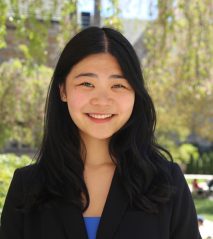Congratulations to the 2024 Undergraduate Senior Prize Winners!

Each year, the Department of Economics awards prizes for outstanding student work in courses and senior essays. This year, the Department is proud to announce the five recipients of those prizes: Anup Bottu, Jorn Dammann, Iris Li, Kyle Shin, and Rock Zhu.
Around 30-50 students write senior essays in economics, and this year these essays spanned a wide array of topics across all fields of economics including econometrics, environmental economics, finance, macroeconomics, spatial economics, and more.
The top essays are nominated for prizes by the student’s advisor and a second reader from the department. A committee of economics faculty members read and select the winning essays, and the prizes are awarded on commencement day during the students’ respective college ceremonies.
The senior essay prizes are as follows:
- The Charles Heber Dickerman Memorial Prize: the best departmental essay(s).
- The Ronald Meltzer/Cornelia Awdziewicz Economic Award: runner-up(s) for the Dickerman Prize.
- The Ellington Prize: the best departmental essay in the field of finance.
Both the Dickerman Prize for the best departmental essay and the Ellington Prize for the best essay in finance go to Rock Zhu for his paper titled “Examining Pairs Trading Profitability,” supervised by William Goetzmann.
The Meltzer/Awdziewicz Prize goes to Iris Li for her paper titled “A Causal Mediation Model on the Valuation Effects of Cross-Listings,” supervised by Xiaohong Chen.
In addition to essays, the Department of Economics awarded two additional prizes to graduating seniors majoring in economics:
- Laun Prize: outstanding course record in all courses taken at Yale College.
- Massee Prize: outstanding record in economics courses.
This year’s Laun Prize goes to Jorn Dammann, and this year’s Massee Prize goes to Kyle Shin and Anup Bottu.
Congratulations to all of these seniors for their exceptional accomplishments! Please see below for more information about the prize winners and their work.

Anup Bottu: Massee Prize
Senior Essay: Examining the Corporate Bond Credit Surface (supervised by John Geanakoplos)
Anup’s Senior Essay studies heterogeneity in the credit spreads of corporate bonds. It creates credit surfaces that plot spreads at a given time as a function of credit rating and leverage. It verifies predictions of the Merton (1974) model using a series of regressions and performs a principal components analysis on movements of the surface. The second principal component reveals that there are moments in which the spreads of riskier firms increase in great excess to the spreads of less risky firms, such as the start of the COVID-19 pandemic. The paper argues that large moves in the second principal component are plausible points for the Fed to intervene and support credit to riskier borrowers.
“My favorite memories in the economics department come from Professor English's course on Monetary Policy and Professor Geanakoplos's course on General Equilibrium. Both courses opened my mind to the power of economics as a lens through which I can understand the world.”
— Anup Bottu, Massee Prize Winner

Jorn Dammann: Laun Prize
Senior Essay: Covariate Adjustment and Post-stratification for Treatment Effect Estimation (supervised by Max Cytrynbaum)
Jorn’s paper studies covariate-adjusted estimation methods for potential outcomes in randomized experiments. We consider a general framework with multiple treatment arms and consider the cases of both covariate-dependent and fixed treatment propensities. Though linear covariate adjustment is a known technique for reducing estimator variance, its interaction with post-stratification is less well-explored. We derive asymptotically optimal linear covariate adjustments for three types of estimators: (i) inverse propensity weighted estimator, (ii) difference-in-means estimator, and (iii) post-stratified difference-in-means estimator. Finally, we provide asymptotically valid confidence intervals for each optimally adjusted estimator. The results illustrate the utility of combining post-stratification and covariate adjustment in randomized experiments for improved inference on potential outcomes and, in turn, arbitrary contrasts of these potential outcomes (e.g., average treatment effects).
“I got interested in economics because the field applies mathematical and statistical tools to questions of social interest in a way that I find well-motivated and exciting.”
— Jorn Dammann, Laun Prize Winner

Iris Li: Meltzer/Awdziewicz Prize
Senior Essay: A Causal Mediation Model on the Valuation Effects of Cross-Listings (supervised by Xiaohong Chen)
A company's decision to list its stock on multiple exchanges has been associated with higher valuation, as well as a change in how informative a company's ordinary stock price listing is. Since informativeness itself has been shown to impact valuation, this thesis applies a causal mediation model to decompose the causal impact that cross-listing has on valuation both directly and indirectly through informativeness. In our analysis, a significant, positive average direct effect and total effect are identified in mediation analysis both at the cross-section and pooled across years. The average indirect effect of cross-listing on valuation through informativeness tends to be negative and smaller in magnitude, but still significant; it is present at the aggregated level and in some years. Therefore, in the absence of a causal mediation model, the positive direct effect of cross-listing may be underestimated.
“I was introduced to the idea of cross-listings during my investment banking internship with Wells Fargo last summer. I saw my thesis as an interesting opportunity to analyze an industry-relevant topic through an academic lens, and I enjoyed the chance to dive into the many potential research pathways focused on the consequences of corporate decision-making.”
— Iris Li, Meltzer/Awdziewicz Prize Winner

Kyle Shin: Massee Prize
Senior Essay: OLS Asymptotics Along Drifting Parameter Sequences for AR(2) Processes (supervised by Max Cytrynbaum)
This paper solves OLS asymptotic behavior for an AR(2) model with drifting au- toregressive parameter sequences. We make extensive use of results regarding AR(1) asymptotics under similar drifting parameter sequences. Then, we attempt to use our results, follow Andrews et al. (2020), and construct a uniform confidence set for the AR(2) parameters that has correct asymptotic size regardless of the true value of the parameters, making them robust in finite samples. However, we show the failure of key continuity assumptions that bars us from using this method.
“Professor Moscarini’s macro class is what inspired me to love economics.”
— Kyle Shin, Massee Prize Winner

Rock Zhu: Dickerman Prize & Ellington Prize
Senior Essay: Examining Pairs Trading Profitability (supervised by William Goetzmann)
This paper analyzes the profitability of pairs trading, a popular statistical arbitrage strategy that identifies close-moving stocks and capitalizes on their temporary divergence. We first replicate the strategy initially proposed by Gatev et al. (2006) using data from the past twenty years and show that a simple benchmark model can result in an average annual excess return of 6.2% and a Sharpe ratio of 1.35. We then delve into the risks of the strategy and show that it is decreasing in the momentum factor and increasing in market risk premium, which suggests that arbitrageurs are compensated for enforcing the Law of One Price. Lastly, we propose and analyze a psychology-based model that generates these empirical findings in equilibrium through simulation. Taken together, these results help bridge the theory and practice of pairs trading.
“I still remember when Professor John Geanakoplos gave his annual talk to Herb Scarf research assistants during the summer after my freshman year. It was the first time I was exposed to what lies beyond the models and methods introduced in the core economics sequence, and, more importantly, how it can assist decision-making in real life. I would go on to take his general equilibrium class the next fall, which made me discover the beautiful applications of math in economics.”
— Rock Zhu, Dickerman Prize & Ellington Prize Winner